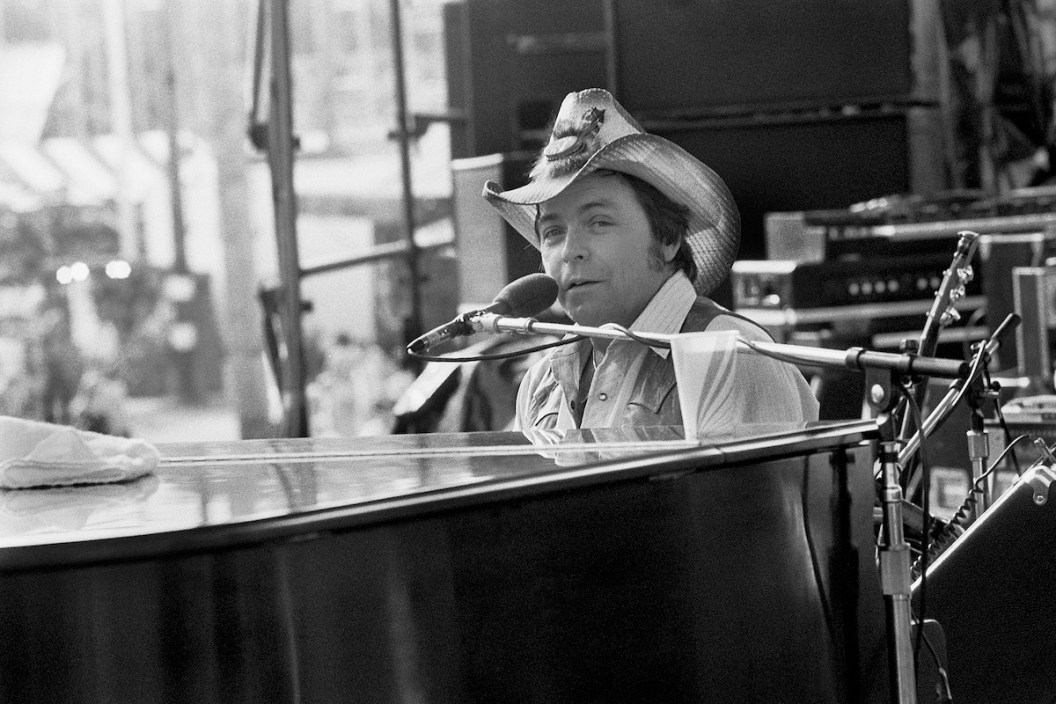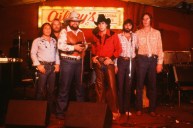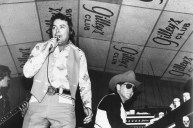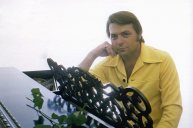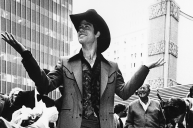All 17 of the late, great Mickey Gilley's No. 1 country hits fall within one of two categories. The first seven topped the charts in the 1970s, when the Mississippi native emerged as a traditional country alternative to more pop-leaning contemporaries. After the 1980 release of the John Travolta film Urban Cowboy and its country history-altering soundtrack, Gilley went mainstream while shifting his nostalgic focus across 10 additional No. 1s from Nashville to popular songs that transcend genre. In the latter case, Gilley didn't so much "sell out" as he bought further into a comparable musical approach as his cousin: rock pioneer and Country Music Hall of Fame member Jerry Lee Lewis.
Videos by Wide Open Country
Such backwards glances have long permeated country music, from the folk songs and fiddle tunes that proved the financial promise of "hillbilly" records a century ago to the reverence for childhood favorites heard in the music of everyone from Gilley contemporary Ronnie Milsap to Luke Combs and other students of '90s country —which itself was a product of artists raised on past country stars plus the Eagles and Bob Seger.
So, Gilley followed a long and ongoing tradition of flavoring new music with familiar influences, and he did it on a high level across two distinct phases of his career. To better establish Gilley's ability to push country music forward while honoring popular songs of the past, we ranked all 17 of his No. 1 hits, which spanned from his mainstream emergence in 1974 to the 1983 end his Urban Cowboy moment.
17. "True Love Ways" (1980)
Gilley began his '80s run of No. 1s with a cover of Texas music great Buddy Holly that previewed more cosmopolitan things to come.
16. "Put Your Dreams Away" (1982)
Gilley's post-Urban Cowboy string of No. 1s elevated the two elite country songwriters behind "Put Your Dreams Away": Richard Leigh (Crystal Gayle's "Don't It Make My Brown Eyes Blue") and a master of sentimental songs, Wayland Holyfield (Don Williams' "You're My Best Friend").
15. "Fool For Your Love" (1983)
Gilley oozes a level of confidence on par with Conway Twitty himself on yet another song that blends retro cool with pop-country sheen. It became Gilley's final solo No. 1 and his ninth chart-topper in a 10-single stretch, which equates an Alabama or Combs level of sustained commercial success.
14. "Paradise Tonight" (With Charly McClain) (1983)
Charly McClain's among the already-active talents to benefit from the pop-country boom that Gilley helped ignite with the Urban Cowboy soundtrack. She scored the second of three No. 1 country hits —sandwiched in between "Who's Cheatin' Who" and "Radio Heart"— with this bubbly tale of great sexual expectations.
13. "Talk to Me" (1982)
Gilley thumbed through the classic R&B playbook to find one of his best songs built around a '50s-style piano arrangement. "Talk to Me" was first recorded in 1958 by Little Willie John. As a Gilley hit, it struck the same (piano) chord as many contemporary singles by Milsap.
12. "Bring It On Home to Me" (1976)
Gilley's first Top 40 Adult Contemporary chart entry predated Urban Cowboy by four years and played up the gospel roots of its writer and original performer, Sam Cooke.
11. "That's All That Matters" (1980)
Ray Price's baritone vocal range made him one of the defining forces of the musically luxurious Nashville Sound. No wonder a song first popularized by Price suited Gilley during his Urban Cowboy moment.
10. "City Lights" (1974)
With this nod to country music's past, Gilley took Bill Anderson's breakthrough composition back to the barrooms.
9. "Window Up Above" (1975)
George Jones wrote and first recorded this classic cheating song inspired by the performance style of Lefty Frizzell. Gilley's version outperformed Jones' 1960 original, which stalled at No. 2 on the Hot Country Songs chart.
8. "You Don't Know Me" (1981)
The covers section of our list continues with a standard credited to Eddy Arnold and one of country music's foundational songwriters, Cindy Walker. A song previously recorded Arnold, Ray Charles, Elvis Presley and others serves as a great example of Gilley leaning into nostalgia while adding his own twist to something instantly familiar.
7. "I Overlooked an Orchid" (1974)
In another instance of Gilley lending a modern touch to an old favorite, he excavated this gem about a missed connection that was first recorded in 1950 by Carl Smith.
6. "Lonely Nights" (1981)
It's surprising that no one during the '90s country boom tried to turn this slow-burning tale of despondence —penned by songwriter Stewart Harris (Wynonna Judd's "No One Else on Earth") and Alan Jackson's go-to producer, Keith Stegall— into a hit.
5. "She's Pulling Me Back Again" (1977)
Gilley capped his '70s run of No. 1s in the middle of a lyrical love triangle that's sweetened by steel guitar and other traditional country elements. It's an even better homage to the Possum than an equally successful cover of "Window Up Above."
4. "Stand By Me" (1980)
Gilley's peak as a crossover artist —it reached No. 22 on the all-genre Billboard Hot 100— and his best-known contribution to the Urban Cowboy soundtrack remains a pop-country benchmark. At the dawn of the '80s, the Ben E. King R&B classic represented simpler times back home for the city-dwellers frequenting nightlife hotspots like Gilley's Club in Pasadena, Texas.
3. "Don't the Girls All Get Prettier at Closing Time" (1976)
Gilley embraced bawdry humor and frenetic rock 'n' roll energy on the definitive song from the year he won the coveted ACM Entertainer of the Year award.
2. "A Headache Tomorrow (Or a Heartache Tonight)" (1981)
Gilley weighs the pluses and minuses of self medicating with alcohol on this tale of heartbreak that could've been a Presley show-stopper a few years prior or a neo-traditional country counter to the Urban Cowboy craze a few years later.
1. "Room Full of Roses" (1974)
Though an impressive list of hits followed, the title track of Gilley's legacy-shaping debut album for Playboy Records — yes, that Playboy (the label was a unit of Playboy Enterprises)— and his first No. 1 best captures the touch of class the singer and pianist brought to honky-tonk tradition.
